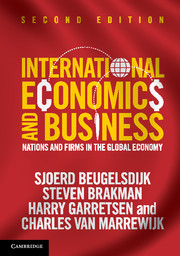Book contents
14 - Globalization and inequality
from Part IV - Consequences of globalization
Summary
Keywords
Growth and poverty • Migration and remittances • Income inequality • Labour skill bias • Technological change • Income distribution • Gini index • Outsourcing • Terms of trade
Introduction
As argued in Chapter 1, we are interested in the economic consequences of globalization, where this term refers to the growing interdependency between nations and firms through international trade, factor mobility, and knowledge spillovers. Throughout the book, we have focused on international trade and capital mobility. In Chapters 3 and 4, we concluded that international trade increases welfare. In Chapter 10, we reached a similar conclusion with respect to international capital mobility, keeping the caveats of Chapters 9 and 11 in mind. It became clear that globalization does not necessarily make everyone better off. In general, there are both winners and losers.
The advocates of globalization argue that the gains outweigh the losses, provided that free trade and financial stability operate under properly functioning international and domestic institutions. The critics of globalization, on the other hand, state that the gains might not outweigh the losses. It is not always clear what the arguments of the opponents to globalization are, but one common factor is a critical attitude towards modern capitalism in general and the multinational in particular. In this view, international competition stimulates a race-to-the-bottom in which the poor have no power to prevent the adverse outcomes of globalization. The main actor in this process is the multinational, which allegedly has the power to ‘rule the world’. In addition, the WTO, IMF, and WB are criticized for serving the interests of large international investors and multinationals, rather than the local citizens of (poor) countries.
- Type
- Chapter
- Information
- International Economics and BusinessNations and Firms in the Global Economy, pp. 409 - 437Publisher: Cambridge University PressPrint publication year: 2013



